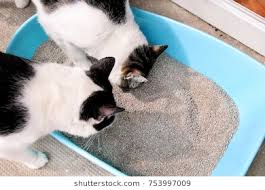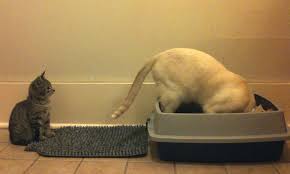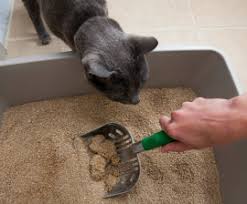Cats and Coprophagia

Coprophagia is the act of eating and ingesting feces. Although far more common in dogs, it does appear occasionally in cats. There are times when eating feces is part of normal feline behavior. A new mother will often eat the feces of her newborn kittens as part of her daily grooming routine, while her kittens may copy her in an effort to learn new behaviors. Cats may also eat their own feces as a way of keeping their personal areas clean.
Oftentimes, however, coprophagia is the result of an underlying medical condition that can lead to an extreme increase in appetite. In order to satisfy this extreme hunger, cats will eat anything available to them, including their feces. The most common medical conditions are parasites, diabetes, inflammatory bowel disease, anemia, vitamin deficiency, malnutrition, thyroid disease and neurological disease.
If your kitty is eating her own feces, your vet will have to determine whether it’s medical or behavioral in nature. A full blood profile will be conducted, including a chemical blood profile, a complete blood count, and a urinalysis. If her coprophagia IS the result of an underlying medical condition, it often stops once treatment begins, with follow up visits recommended during the first few months.
If it’s the result of a behavioral problem, provide your vet with a thorough history of your cat’s general health, diet, appetite, handling practices, recent activities and environment, and then take steps to remedy the situation.
The simplest way to prevent your cat from eating her feces is to eliminate her access to it by scooping her litter box several times a day. It can also be useful to change the location of the box, moving it to an area that affords her more privacy when she uses it.
A fixed routine of vigorous play and exercise can help distract her from engaging in coprophagia. Exercise aids in reducing anxiety and stress, and when a cat’s had enough stimulation to keep her active and tire her out, she’ll be less attracted to eating non-food items. But if your cat isn’t used to being exercised regularly, keep your initial play sessions short (begin with only a few minutes) and slowly work up to longer sessions as she becomes more accustomed to it.
Ensure that your cat is not only eating the required amount of food for her age and weight each day, but that she’s receiving all of the essential minerals and vitamins she needs. If not, have your vet recommend the best nutritional supplements to keep her diet the best balanced diet paws-ible.



